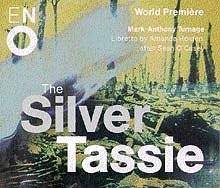Ever since Greek burst onto the scene back in 1988, a follow-up from Mark-Anthony Turnage has been keenly anticipated. The Silver Tassie, to a libretto by Amanda Holden after the play by Sean O'Casey, has been several years in the making, most recently in the workship environment of the ENO Opera Studio; the result is the most streamlined and cohesive full-length opera to hit the London stage in well over a decade.O'Casey's drama is not the most obvious of choices. Controversial when it opened in London in 1928, it did not even reach the Dublin stage, and was largely responsible for the author's break with the theatre scene there. Certainly its pacifist and socialist overtones would not have endeared themselves in a society struggling with the aftermath of independence and civil war. Holden has fashioned a workmanlike text with a feel for time and place: if few of the characters emerge as little more than stereotypes, this does not weaken the clarity of O'Casey's perspective, or his identification with the 'victims' whose shallow and mean-spirited lives he depicts.
The structure falls naturally into four acts, with Harry, the eventual anti-hero, absent for much of Act 1 and the whole of Act 2. In what might prove a dramatic error, Harry has little enough time to establish his identity, as the local footballing hero returning to the front, and his absence from the war act limits both the impact of him in his prime and the overall dramatic follow-through. Musically impressive though much of this latter act is, with Turnage's writing for strings taking on new expressive potency, the sense remains of a static anti-war tableau, outside the main drama. The reintroduction of Harry and his sidekick Barny, at the point of the impromptu football match, could have reinforced his initial, positive image without harming the inevitability of O'Casey's design.
Act 3 finds Harry in convalescence, his paralysis from the waist down an unspoken certainty and Barny having been awarded the Victoria Cross for 'saving' his friend, delivering flowers from Harry's sweetheart Jesse, whose disinterest is only too apparent. Turnage treats this succession of curt, intense exchanges as a slow-motion scherzo, opening out into the extended dance sequence of the final act. With Harry's confinement and Barny's association with Jesse confirmed, the former's bitterness takes centre-stage; his reflection on the silver tassie of his footballing success, and eventual departure with Teddy, his blinded neighbour, elicit some of Turnage's most poignant expression: the reckless emotion of Greek now transmuted into mature compassion. Both here and in the two orchestral interludes which link the acts in pairs, the intensity of musical expression bodes well for any future operas he may write.
The cast was a strong one, with Gerald Finley magnetic as Harry, Mary Hegarty cuttingly flirtacious as Jesse, and Sarah Connolly convincing as the religion-crazed Susie, for whom war is an unwitting means of emancipation. Gwynne Howell is suitably implaccable in the Greek Chorus-like role of The Croucher. Paul Daniel secured the customary high standard from the ENO orchestra, with Turnage's idiomatic differentiation of wind and brass timbre given real plangency. Bill Bryden's production was evocative and non-intrusive, with subtle and telling lighting and a seamless transition between acts. An all-round artistic success for ENO: a revival will surely not be long in coming.
Richard Whitehouse

 Return to:
Return to: